OOOOOOOOOOOOOOOOOOOOOOOOOOOOOOOOOOOOOOOOOOOOOOOOOOOOO
Let's start out with this: Just because an actress or actor was a hit in a Broadway Show doesn't mean that they are perfect for the movie version. Ethel Merman was great as Madam Rose on Broadway, but she's never been a crowd pleaser in the movies. It's true that she did the movie version of her Broadway hit "Call Me Madam" but it was not her name that brought the people to the movie theaters; it was Donald O'Connor, Vera Ellen, George Saunders and Billy De Wolfe. Even in "There's No Business Like Show Business" the cast of Dan Daily, Mitzi Gaynor and Johnny Ray were the ones who brought the paying movie public to the theaters. It's true that at one time 20th Century Fox was going to film "Gypsy" with Ethel Merman and Mitzi Gaynor playing Gypsy Rose Lee, but that didn't pan out, so Warners bought the rights and Rosalind Russells husband made a deal that would give Rosalind Russell the right to make the movie.
So, what about Rosalind Russell singing her songs: In Rosalind Russells autobiography she states, "No matter what anyone says, that's Roz up there singing the songs". Well, that's not exactly true and one of the proofs is that on the soundtrack album they don't give Russell the credit for singing her songs. Actually most of the singing was done by her, but when it came to "Everythings Coming Up Rose" she just couldn't hit the ball into the outer-field, so Warners paid Lisa Kirk a hefty sum for dubbing that song for Russell. Now, whether Natalie Wood could or could not sing is not a problem. After all, neither could Gypsy Rose Lee, but Woods numbers at the end of the film as the stripper are excellent, and she favored Gypsy Rose Lee more than Mitzy Gaynor would have.
So, why doesn't a lot of people like this movie version of Gypsy? Well, to thoroughly enjoy it, stop comparing Russell with Merman. That's a beginning. Merman could not bring the people into the movie theaters, maybe so on Broadway, but there is not enough Broadway fans out there to pay for the cost of the movie, but there were with Rosalind Russell, Natalie Wood, and Karl Malden. The next thing: You have to see this movie in a movie theater where you can experience the sweeping Technirama Wide Screen process with Stereophonic Sound. Seeing this movie on T.V. doesn't get it although if you can get a Letter-Box Version of it with a very big T.V. screen, it can be quite enjoyable, but the movie theater is the best place!
So, what about Rosalind Russell singing her songs: In Rosalind Russells autobiography she states, "No matter what anyone says, that's Roz up there singing the songs". Well, that's not exactly true and one of the proofs is that on the soundtrack album they don't give Russell the credit for singing her songs. Actually most of the singing was done by her, but when it came to "Everythings Coming Up Rose" she just couldn't hit the ball into the outer-field, so Warners paid Lisa Kirk a hefty sum for dubbing that song for Russell. Now, whether Natalie Wood could or could not sing is not a problem. After all, neither could Gypsy Rose Lee, but Woods numbers at the end of the film as the stripper are excellent, and she favored Gypsy Rose Lee more than Mitzy Gaynor would have.
So, why doesn't a lot of people like this movie version of Gypsy? Well, to thoroughly enjoy it, stop comparing Russell with Merman. That's a beginning. Merman could not bring the people into the movie theaters, maybe so on Broadway, but there is not enough Broadway fans out there to pay for the cost of the movie, but there were with Rosalind Russell, Natalie Wood, and Karl Malden. The next thing: You have to see this movie in a movie theater where you can experience the sweeping Technirama Wide Screen process with Stereophonic Sound. Seeing this movie on T.V. doesn't get it although if you can get a Letter-Box Version of it with a very big T.V. screen, it can be quite enjoyable, but the movie theater is the best place!
As far as other versions of Gypsy are concerned: Bette Midler was awful in the role of Madam Rose. They should have lowered her singing into a lower key. She just sounded like she was straining to get to her top notes that you wondered if she was going to make it, and even though Midler said she was born to play Madam Rose; "Oh no she wasn't!" Bad version. Didn't have the slick quality of the movie. I saw Mitzi Green do it on the stage, and even though she was no Ethel Merman, she did a great job in the road company. Joann Whorley of Laugh in Fame played Madam Rose at Dayton, Ohio's "Kenley Theater" and she quite frankly rocked the joint. She was loud, brassy and wonderful, but if anyone is Ethel Mermans successor, it's Tyne Daly who played Rose at Lincoln Center and won a Tony, and the critics said that "Merman would be proud!" So, even though I'm not really a fan of Rosalind Russell, if you erase Merman from your mind, this is a wonderful, rousing, screen adaptation of "Gypsy" and it shouldn't be missed!
OOOOOOOOOOOOOOOOOOOOOOOOOOOOOOOOOOOOOOOOOOOOOOOOO
OOOOOOOOOOOOOOOOOOOOOOOOOOOOOOOOOOOOOOOOOOOOOOOOO
CRITICA EN EL PERIÓDICO "ABC DE SEVILLA" (30-6-1973)
Comedia biográfica musical, ambientada en los años veinte, en Estados Unidos. Se nos cuenta la historia de una famosa artista de vaudeville: Gypsy Rose Lee. Doña Gypsy se propone hacer de sus dos hijas June y Louise, dos auténticas estrellas de la revista teatral. Y la buena señora no para en medios para conseguir el fin propuesto. Presenta las niñas Bay June y Baby Louise en una función infantil de promoción de futuros valores. Allí conocen a Herbie Sommers, hombre introducido en los medios teatrales y posterior apoderado de la compañía juvenil de variedades. De un lado para otro, visitan varias ciudades, actuando siempre la hermana June como artista principal y su hermana Louise de segundona... Pasan los años y las niñas crecen; la voz cambiada es ya un problema, y el señor Herbie Sommer se enamora de la madre de las chavalas y más, puntos suspensivos, hasta llegar a un "The End" en el que felizmente madre e hija Louise comen perdices cada una por su lado; pero, eso sí, después de que Natalie Wood ha triunfado en el music-hall (en general). El realizador, Le Roy, nacido en 1900, empezó bien, con peliculas como "Soy un fugitivo" (1932), "Hampa dorada", "El mago de Oz", "El puente de Waterloo" y otras; pero el vil metal y otros atractivos, ya se sabe que corrompen, y tiró por el camino... que va a la ermita, y le salieron productos como este, con tufillo camp, ligeramente hortera y con muchos colorines. Un error grave, es la elección de Natalie Wood para el papel que exigía un carácter más frívolo que el de la señora Wood. en fin una cinta que hará las delicias de muchos mayores y jóvenes nostálgicos.-A. F. M.
OOOOOOOOOOOOOOOOOOOOOOOOOOOOOOOOOOOOOOOOOOOOOOOOO
TIEMPO DE MIRAR "ROSÁLIND RUSELLS SHOW"
SÁBADO, 17 DE JUNIO DE 1972
Allá por los años 20, ante el alarmante cariz que tomaban las cosas del arte en nuestro país, un grupo de jóvenes airados pusieron el grito en el cielo en un manifiesto de rompe y rasga, violento, debelador de muchas de las paparruchadas estéticas del momento. Me parece que la catalinaría llevaba la firma de Gasch, de Díaz Plaja, de Dalí, de Ferrán y de otros de criterio sano, abierto, independiente e incorruptible. Entre muchas otras cosas, la famosa proclama afirmaba rotundamente, que había mucho más helenismo en el punto canalé de un jersey del tenista Pancho González, que en todas las danzas griegas de doña Áurea de Sarrá, ínfima imitadora de los histerismos clásicos de la Duncan. Dicha hoja, incitadora a la subversión en los medios burgueses del arte del «tortellet» matinal de los domingos, sacudió los cimientos de Can Pares y provocó desmayos y aspavientos por doquier. Muy en especial en conservatorios y academias. Muchos fueron los bomberos empeñados en la tarea de apagar aquellos fuegos protestatarios de unos jóvenes rebeldes con causa más que justificada. Hoy, como ranitas croando canciones pop, folk, fres y etc, en su tranquilo estanque de la paz, las jóvenes generaciones contemplan impasibles el «crocant» de la Sagrada Familia. Falta el grupo impetuoso que, en otra hoja amarilla, asevere que hay más Gaudí en un canto rodado del Congos!, que en el pegote de cemento y falsa piedra que se levanta insolente, ante las cuatro torres. En esto cavilaba yo la otra noche después de haber visto el filme de Rosalind Rusell, «La reina del vodevil». Hay más espectáculo y más verdad cinematográfica en una simple-pirueta de la Rusell en su número de «strip-tease» en las candilejas del «Burlesque», que en todas las pedanterías fílmicas de un Polansky o de un Pasolini. La película de Rosalind trata de la vida de, Gipsy Rose Lee, la famosísima «stripteause» norteamericana. Tengo entendido que el apellido [o apelativo) Lee encierra alguna determinada significación. Suena en mis oídos una canción de los 30 («Dtnah»), en la que se nos aseguraba que Diana era la «everyone finest of state of Carolíne», por llamarse precisamente Lee. Me gustaría pedir a mi admirado maestro Zúñiga una explicación sobre el papel que juega la palabra Lee añadida a los populares del «show bussiness». Él filme llega con cierto retraso a causa de todos esos problemas que afectan a la programación de películas y que obedecen sobre todo, a la acentuada crisis en la producción y a la crisis crónica en los criterios seleccionado-res de películas v demás cosas parecidas. «La reina del vodevil» es una película musical. Mejor dicho, una comedia con números musicales. Fue rodada con presupuesto limitado y su metraje no sobrepasa la hora y media de proyección, que es la duración ideal de toda obra cinematográfica que se precie de perfecta. Ha sido dirigida por Mervyn Le Roy, un viejo león de Hollywood que conoce muy a fondo su oficio. La acción se sitúa en el ambiente teatral de los Estados Unidos en los años 20. Es la gran época del triunfo de las «babies». Robert Aldricht, aludió a este fenómeno teatral con su esperpéntica «Babe Jane», parece que la máxima aspiración de muchas familias era lograr el triunfo de uno de sus retoños en las variedades. Mamá Rusell es madre de una «babe». Se llama «Babe Rose», Es un cielo de niña, con sus rubios tirabuzones y sus mohines picarescos de marisabidilla aventajada. Mamá Rusell y su «babe» entran en tromba en los escenarios, imponen contratos, arremeten con violencia contra empresarios, no dejan títere con cabeza. En uno de sus espectaculares arrebatos tropieza con Karl Malden, especialista én promocionar «babies» a través de concursos, exhibiciones, espectáculos. Si el fregocro le falla, Malden, que es un hombre de recursos «selfmade», sabe cómo vender chicles y «candies» en los cines de barrio.
En un momento de apuro la «babe» crece día a día y los gustos del público cambian con rapidez, Karl consigue un contrato para actuar en un «burlesque». Los eruditos saben cuál es la abismal diferencia entre un local de «vaudeville» y un «burlesque» en los EE-UU. Tras las cortinas del escenario, Louise, la hermana mayor de Babe Rose, es adiestrada en el estilo «burlesque» por las más expertas «teloneras» del local. Y nace Gipsy Rose Lee.
Gipsy se convierte en la gran superestrella del «music-hall». La película concluye con la escena explosiva del número de Gipsy evocando a su hermana «Babe Rose». «My name is Gipsy Rose Lee, what's your?» —pregunta Natalia Wood mientras se quita el guante que inicia su destape. Y las damas y caballeros del «nigth-club» caen en trance. La película tiene ingenio, ocurrencia y chispa. La película cuenta con Rosalind Rusell que es una actriz de campanillas. En la década de los 30, Hollywood, demasiado atento al «star system», hizo de la Rusell una «segunda». Pero ella supo demostrar en Broadway su verdadera talla de gran y primerisíma figura. En los años 50 y 60 el cine yanqui visionó mejor el talento de Rosalind. Rescatada de las tablas, después de sus triunfos con textos de Giradoux, Anouihl, Miller, Williams, Shakespeare se montaron para ella interesantes piezas. Auntie Mame, «Picnic» (inolvidable en su papel de solterona) y esa biografía de Gipsy Rose.
Vestuario especial, maquillaje especial, peluquero especial, fotógrafo especial y un director enterado del oficio para coordinar la interpretación suelta, totalmente libre, espontánea, dinámica y vital fruto del genio y del ímpetu de la más acabada y completa actriz de la farándula norteamericana.
El espectáculo se define como aquello que se ofrece a la vista o a la contemplación intelectual y es capaz de interesar y mover el ánimo.
Tal como están las carteleras cinematográficas de la ciudad, el torbellino Rosalinda nos aporta lo más auténtico, lo más vivo y lo más real del histrionismo en la escena y en los platos. — Jorge TORRAS
OOOOOOOOOOOOOOOOOOOOOOOOOOOOOOOOOOOOOOOOOOOOOOOOOOOOOO
Everything's coming up roses because I CERTAINLY let it entertain me!
I have LOVED this musical for about seven years... and seen both Roz & Bette's versions... now, I know most people prefer Bette... but I don't. I mean... I've read reviews where people said "Forget the '62 version... go rent Bette's!" Maybe I'm crazy... I mean, I adore Bette Midler to death, but I think Roz did a better job of actually PLAYING the part. Sure, she may not have the vocal talents of Midler and Merman... but who does?! She's more of what I imagined the real Rose Hovick to be... and she's just so... I don't know. The way she delivered her lines... it was perfection. She also made me feel just a tad sorry for Rose... now I never saw Ethel Merman play the part, but Bette never made me feel sorry for Rose. Roz does. And that's a great talent whenever you can play a part where you have people hating and yet, at the same time, feeling sorry for the character. She was absolutely brilliant in the part and I don't see how people cannot recognize this! I also enjoyed Karl Malden in the role of Herbie better than Peter Reigert (I believe that was his name). He brought such life to the role. And although Cynthia Gibb did a good job of playing Louise... Natalie Wood... I mean, who can top THAT? Natalie Wood was GREAT!!!! She was perfect as the sort of quiet, shy child that grew up into a glamorous queen of the striptease. Diane Pace who played Louise as a child did a FINE job too! Cute little girl. And then... Morgan Brittany (who is billed as Suzanne Cupito) and Ann Jillian as Baby and Dainty June... how awesome is that?! Who knew that Ann Jillian could SING? I sure didn't. Paul Wallace was awesome as Tulsa... lots of talent. It's a GREAT movie, even if it WAS a bit altered from the Broadway play... but hey, the play was a bit altered from the true life story so... what does it matter?! A GREAT MOVIE, HIGHLY RECOMMENDED!!!!!
OOOOOOOOOOOOOOOOOOOOOOOOOOOOOOOOOOOOOOOOOOOOOOOOOOOOO
Bravo to Russell and Wood!
Rosalind Russell, a true world-class actress, brought perfect line readings and comic timing and delivery, along with a nice patrician air, to the role of Rose, and no one has matched her -- before or since. I've seen every Mama Rose -- Merman, Peters, Midler, Lansbury, Betty Buckley, Andrea McArdle, Mary McCarty, Joanne Worley and Giselle MacKenzie -- and none of them touches Russell in the role, certainly not in the kind of nuanced humanity she brought to it. (There have been a lot of caricaturing, mugging and over-acting in this role.) And Natalie Wood is the only actress I've seen to do anything remotely three-dimensional with the underwritten role of Louise/Gypsy. Bravo to both!
OOOOOOOOOOOOOOOOOOOOOOOOOOOOOOOOOOOOOOOOOOOOOOOOOOOOOO
An unusual musical
This is an unusual musical film, loosely based on (not directly copied from) the Broadway musical of the same name, using the music by Sondheim & Stein. (Among its better known songs are: "Everything's Coming Up Roses," "Let Me Entertain You").
The Broadway play was loosely based on Gypsy Rose Lee's fairy tale version of growing up under the strong hand of her mother (Rose Hovick) along with her younger sister, June Havoc, who earlier escaped Momma Rose's clutches and much later became a stage, movie, & TV star.
Rosalind Russell's performance (Momma Rose) has often been criticized as being inferior to Ethel Merman's although Russell (IMO) delivers a very strong performance. Much of the difference is that in the stage version, most of Momma Rose's dark side is not shown; in Russell's version, one sees a slightly more realistic version of Momma Rose.
Russell's Momma Rose increasingly becomes (IMO) an unlikeable character rather than one brassy, funny, and larger than life. This is a bit closer to the real Momma Rose (read Noralee Frankel's "Stripping Gypsy" for an excellent biography). Momma was an extremely demanding woman, more than a bit psychopathic, who not only pressed both of her daughters to earn money for her but also drove them emotionally away. Karl Malden as Momma Rose's put-upon lover-in-waiting stands in for the many men Momma Rose actually conned and he brings enough sympathy to his role that it adds more fuel to disliking the Momma Rose that Russell brings to life. Natalie Wood is a very believable Gypsy.
An interesting film, both for its presentations of family relationships and for an era. If the film was less detailed, shorter, possibly its emotional impact would have been closer to that of the stage version. As it is, Momma's selfishness, her determination to get whatever she wanted at any cost, becomes dominant and one is thankful her two daughters escaped.
The difference between the versions of Momma Rose presented in this film and that of the stage musical stimulated me to read Frankel's excellent biography ("Stripping Gypsy"), Preminger's (Gypsy's son) "Gypsy & Me" AKA "My G-String Mother," plus June Havoc's "Early Havoc" & "More Havoc." (Plus Abbot's less helpful biography of Gypsy: "American Rose.")
Fascinating family to explore!
I also read Gypsy's fantasy, "Gypsy, a Memoir," the foundation on which the musical was built. It's interesting storytelling but a fairy tale. Momma Rose died a few years before "Gypsy," her book, was published. On her death bed, Momma Rose died putting a curse on Gypsy as Gypsy was trying to comfort her. But a great story is more acceptable than the truth and, besides, Gypsy had learned quite well from her mother the marketable advantage of spinning interesting stories!
The Broadway play was loosely based on Gypsy Rose Lee's fairy tale version of growing up under the strong hand of her mother (Rose Hovick) along with her younger sister, June Havoc, who earlier escaped Momma Rose's clutches and much later became a stage, movie, & TV star.
Rosalind Russell's performance (Momma Rose) has often been criticized as being inferior to Ethel Merman's although Russell (IMO) delivers a very strong performance. Much of the difference is that in the stage version, most of Momma Rose's dark side is not shown; in Russell's version, one sees a slightly more realistic version of Momma Rose.
Russell's Momma Rose increasingly becomes (IMO) an unlikeable character rather than one brassy, funny, and larger than life. This is a bit closer to the real Momma Rose (read Noralee Frankel's "Stripping Gypsy" for an excellent biography). Momma was an extremely demanding woman, more than a bit psychopathic, who not only pressed both of her daughters to earn money for her but also drove them emotionally away. Karl Malden as Momma Rose's put-upon lover-in-waiting stands in for the many men Momma Rose actually conned and he brings enough sympathy to his role that it adds more fuel to disliking the Momma Rose that Russell brings to life. Natalie Wood is a very believable Gypsy.
An interesting film, both for its presentations of family relationships and for an era. If the film was less detailed, shorter, possibly its emotional impact would have been closer to that of the stage version. As it is, Momma's selfishness, her determination to get whatever she wanted at any cost, becomes dominant and one is thankful her two daughters escaped.
The difference between the versions of Momma Rose presented in this film and that of the stage musical stimulated me to read Frankel's excellent biography ("Stripping Gypsy"), Preminger's (Gypsy's son) "Gypsy & Me" AKA "My G-String Mother," plus June Havoc's "Early Havoc" & "More Havoc." (Plus Abbot's less helpful biography of Gypsy: "American Rose.")
Fascinating family to explore!
I also read Gypsy's fantasy, "Gypsy, a Memoir," the foundation on which the musical was built. It's interesting storytelling but a fairy tale. Momma Rose died a few years before "Gypsy," her book, was published. On her death bed, Momma Rose died putting a curse on Gypsy as Gypsy was trying to comfort her. But a great story is more acceptable than the truth and, besides, Gypsy had learned quite well from her mother the marketable advantage of spinning interesting stories!
OOOOOOOOOOOOOOOOOOOOOOOOOOOOOOOOOOOOOOOOOOOOOOOOOOOOO
Everythings Comin' Up Rose for Those Who See Gypsy
Let's start out with this: Just because an actress or actor was a hit in a Broadway Show doesn't mean that they are perfect for the movie version. Ethel Merman was great as Madam Rose on Broadway, but she's never been a crowd pleaser in the movies. It's true that she did the movie version of her Broadway hit "Call Me Madam" but it was not her name that brought the people to the movie theaters; it was Donald O'Connor, Vera Ellen, George Saunders and Billy De Wolfe. Even in "There's No Business Like Show Business" the cast of Dan Daily, Mitzi Gaynor and Johnny Ray were the ones who brought the paying movie public to the theaters. It's true that at one time 20th Century Fox was going to film "Gypsy" with Ethel Merman and Mitzi Gaynor playing Gypsy Rose Lee, but that didn't pan out, so Warners bought the rights and Rosalind Russells husband made a deal that would give Rosalind Russell the right to make the movie.
So, what about Rosalind Russell singing her songs: In Rosalind Russells autobiography she states, "No matter what anyone says, that's Roz up there singing the songs". Well, that's not exactly true and one of the proofs is that on the soundtrack album they don't give Russell the credit for singing her songs. Actually most of the singing was done by her, but when it came to "Everythings Coming Up Rose" she just couldn't hit the ball into the outer-field, so Warners paid Lisa Kirk a hefty sum for dubbing that song for Russell. Now, whether Natalie Wood could or could not sing is not a problem. After all, neither could Gypsy Rose Lee, but Woods numbers at the end of the film as the stripper are excellent, and she favored Gypsy Rose Lee more than Mitzy Gaynor would have.
So, why doesn't a lot of people like this movie version of Gypsy? Well, to thoroughly enjoy it, stop comparing Russell with Merman. That's a beginning. Merman could not bring the people into the movie theaters, maybe so on Broadway, but there is not enough Broadway fans out there to pay for the cost of the movie, but there were with Rosalind Russell, Natalie Wood, and Carl Malden. The next thing: You have to see this movie in a movie theater where you can experience the sweeping Technirama Wide Screen process with Stereophonic Sound. Seeing this movie on T.V. doesn't get it although if you can get a Letter-Box Version of it with a very big T.V. screen, it can be quite enjoyable, but the movie theater is the best place!
As far as other versions of Gypsy are concerned: Bette Midler was awful in the role of Madam Rose. They should have lowered her singing into a lower key. She just sounded like she was straining to get to her top notes that you wondered if she was going to make it, and even though Midler said she was born to play Madam Rose; "Oh no she wasn't!" Bad version. Didn't have the slick quality of the movie. I saw Mitzi Green do it on the stage, and even though she was no Ethel Merman, she did a great job in the road company. Joann Whorley of Laugh in Fame played Madam Rose at Dayton, Ohio's "Kenley Theater" and she quite frankly rocked the joint. She was loud, brassy and wonderful, but if anyone is Ethel Mermans successor, it's Tyne Daly who played Rose at Lincoln Center and won a Tony, and the critics said that "Merman would be proud!" So, even though I'm not really a fan of Rosalind Russell, if you erase Merman from your mind, this is a wonderful, rousing, screen adaptation of "Gypsy" and it shouldn't be missed!
So, what about Rosalind Russell singing her songs: In Rosalind Russells autobiography she states, "No matter what anyone says, that's Roz up there singing the songs". Well, that's not exactly true and one of the proofs is that on the soundtrack album they don't give Russell the credit for singing her songs. Actually most of the singing was done by her, but when it came to "Everythings Coming Up Rose" she just couldn't hit the ball into the outer-field, so Warners paid Lisa Kirk a hefty sum for dubbing that song for Russell. Now, whether Natalie Wood could or could not sing is not a problem. After all, neither could Gypsy Rose Lee, but Woods numbers at the end of the film as the stripper are excellent, and she favored Gypsy Rose Lee more than Mitzy Gaynor would have.
So, why doesn't a lot of people like this movie version of Gypsy? Well, to thoroughly enjoy it, stop comparing Russell with Merman. That's a beginning. Merman could not bring the people into the movie theaters, maybe so on Broadway, but there is not enough Broadway fans out there to pay for the cost of the movie, but there were with Rosalind Russell, Natalie Wood, and Carl Malden. The next thing: You have to see this movie in a movie theater where you can experience the sweeping Technirama Wide Screen process with Stereophonic Sound. Seeing this movie on T.V. doesn't get it although if you can get a Letter-Box Version of it with a very big T.V. screen, it can be quite enjoyable, but the movie theater is the best place!
As far as other versions of Gypsy are concerned: Bette Midler was awful in the role of Madam Rose. They should have lowered her singing into a lower key. She just sounded like she was straining to get to her top notes that you wondered if she was going to make it, and even though Midler said she was born to play Madam Rose; "Oh no she wasn't!" Bad version. Didn't have the slick quality of the movie. I saw Mitzi Green do it on the stage, and even though she was no Ethel Merman, she did a great job in the road company. Joann Whorley of Laugh in Fame played Madam Rose at Dayton, Ohio's "Kenley Theater" and she quite frankly rocked the joint. She was loud, brassy and wonderful, but if anyone is Ethel Mermans successor, it's Tyne Daly who played Rose at Lincoln Center and won a Tony, and the critics said that "Merman would be proud!" So, even though I'm not really a fan of Rosalind Russell, if you erase Merman from your mind, this is a wonderful, rousing, screen adaptation of "Gypsy" and it shouldn't be missed!
OOOOOOOOOOOOOOOOOOOOOOOOOOOOOOOOOOOOOOOOOOOOOOOOOOOOOO
A wonderful film.
This is a great film. It is not an exact duplicate of the stage show, but what movie musical is? Funny Girl on film is not the same as Funny Girl on stage, but both are very entertaining. The same is true here.
Rosilind Russell shows us the shades of a character that is very complex. She didn't do her own singing, but, so what? She did a great job of performing during the songs, and her overall performance throughout the movie is wonderful. She is not Bette Midler, but who is? For that matter, if you listen to the multiple versions of the cast albums and soundtracks, I am not sure you wouldn't find Angela Lansbury's performance the best one out there.
The rest of the cast is also wonderful to watch. To this day, I cannot watch Natalie Wood in the "Little Lamb" number without tears coming to my eyes. Her interpretation of a lost little girl who always plays second fiddle and doesn't even know how old she is always gets to me. And the duet "If Momma Was Married", with Ann Jillian, is a memorable number. For those who didn't know Ann Jillian could sing, she has played on Broadway for years, most notably in "Sugar Babies".
I think we all can appreciate the fact that this is a version which can be loved on its own, while still having a similar degree of affection for the 1993 version.
OOOOOOOOOOOOOOOOOOOOOOOOOOOOOOOOOOOOOOOOOOOOOOOOOOOOO
Dynamite production
A movie with an odd trade-off. While its a pity that Ethel Merman's knockout stage performance wasn't captured on film and her vocal renditions are of course inimitable she was never the most subtle of actresses able to convey delicate emotions. Therein lays the trade-off while Rosalind Russell was not an accomplished singer and is dubbed throughout the film she was a far superior actress enabling her to infuse the overbearing Mama Rose with emotional resonance. While she will never be a sympathetic character Roz provides some insight and offers a little understanding into her mad drive. The real Gypsy Rose Lee was assuredly more calculating and tough than she is presented here but that's an author's prerogative. Natalie Wood makes her beautiful, vulnerable and shimmering with star quality but until the great showdown scene near the end the character is really secondary. Karl Malden fills out the only other really important part as Herbie with terrific sensitivity. The music is all sensational and You Gotta Have a Gimmick is wonderfully performed. Unfortunately a few numbers were cut to keep the running time down for theatrical showings but even without them this is a high quality production from the last days when the studios still knew how to effortlessly manufacture this type of musical.
OOOOOOOOOOOOOOOOOOOOOOOOOOOOOOOOOOOOOOOOOOOOOOOOOOOO
THE great American musical...
is an ok film. Rosalind Russell is wonderful as Mama Rose in every detail except in the singing. It's obvious that she did some of the songs herself, but Lisa Kirk (a Broadway star in her own right) did most of it. This hurts the finished product. One can't help be sorry that Ethel Merman didn't get to film her greatest stage success. What a shame. Merman would have been electrifying, especially in the final number, "Rose's Turn." Listening to the CD of the Broadway original cast gives a hint of what Merman would have done with this GREAT musical number. Possibly the single greatest number in American musical history, "Rose's Turn" combines everything in the mother's life that has not come true: her own moment of being a STAR. Russell is ok, but it's obvious that most of the number is sung by someone else. Merman, on the CD, growls and shrieks her lament of not having a chance. The lyrics scream of sorrow and remorse. Russell goes thru the motions; Merman lives the pain. Natalie Wood and Karl Malden are good; Betty Bruce (Miss Electra) and Faith Dane (Miss Mazzeppa) are hilarious as tawdry strippers. Worth a look, but hard to forget this SINGLE greatest casting ERROR in Hollywood history.
----------------------------------------------------------------------
OTRAS PÁGINAS EN ESPAÑOL
OOOOOOOOOOOOOOOOOOOOOOOOOOOOOOOO
MY WEB PAGE TO NATALIE WOOD MOVIES



.png)

.jpg)





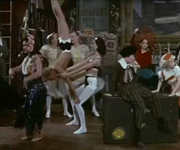






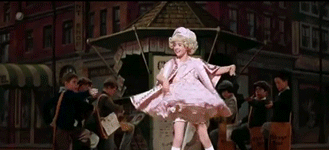



















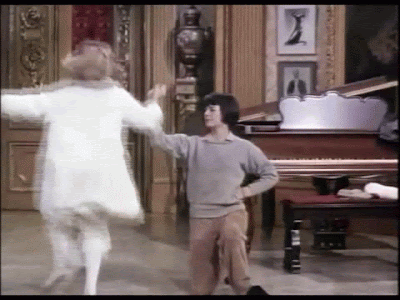


















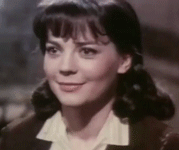





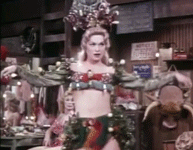

































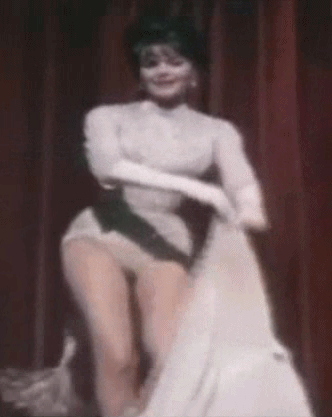












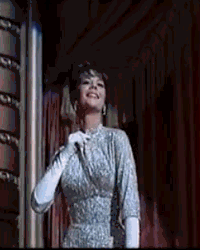


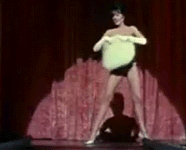





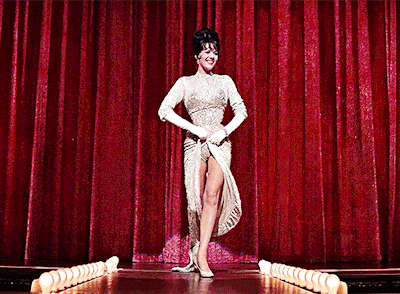




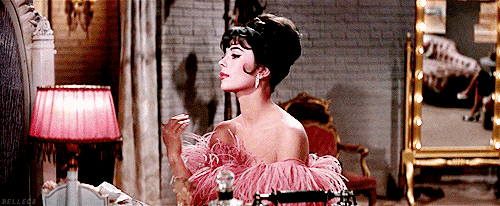
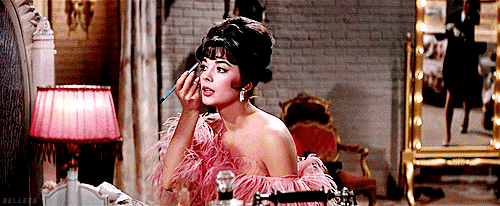
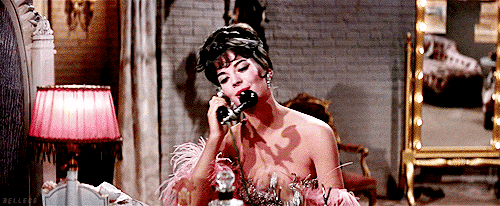











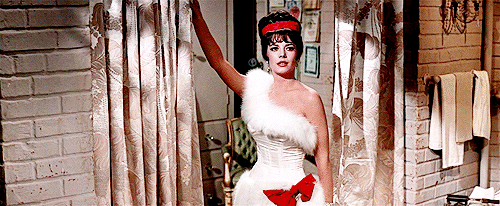


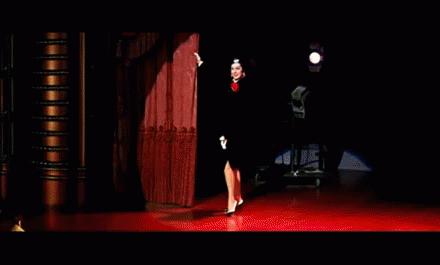
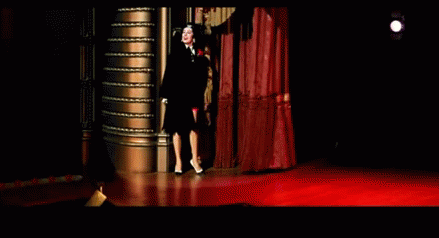






































.jpg)







.jpg)





.png)




.jpg)






.jpg)













.jpg)


.jpg)










.jpg)



.jpg)

.gif)

.jpg)



.jpg)

















.jpg)
.jpg)

.jpg)
.jpeg)
No comments:
Post a Comment